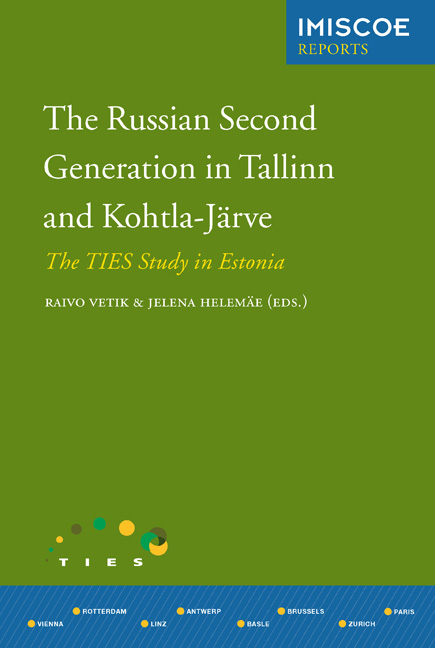Book contents
- Fronmatter
- Contents
- Preface
- List of Tables, Figures and Chapter Appendices
- 1 Introduction
- 2 Migration Patterns
- 3 Integration Policies
- 4 Ethnic Inequalities in Education
- 5 Explaining Different Returns from Human Capital in the labour Market
- 6 Income Inequality
- 7 Housing Conditions Andneighbourhood Satisfaction
- 8 Contact and Crisis in Interethnic Relations
- 9 Gender role Attitudes
- 10 Sense of Belonging to Estonia
- 11 Conclusions
- Appendix
- List of Contributors
- Other IMISCOE Titles
3 - Integration Policies
Published online by Cambridge University Press: 20 January 2021
- Fronmatter
- Contents
- Preface
- List of Tables, Figures and Chapter Appendices
- 1 Introduction
- 2 Migration Patterns
- 3 Integration Policies
- 4 Ethnic Inequalities in Education
- 5 Explaining Different Returns from Human Capital in the labour Market
- 6 Income Inequality
- 7 Housing Conditions Andneighbourhood Satisfaction
- 8 Contact and Crisis in Interethnic Relations
- 9 Gender role Attitudes
- 10 Sense of Belonging to Estonia
- 11 Conclusions
- Appendix
- List of Contributors
- Other IMISCOE Titles
Summary
Introduction
This chapter discusses integration policies in Estonia. The introduction outlines the main lines of the debate on Estonian integration policies in academic literature. The second section specifies the main challenges of generic integration policy in Estonia, as compared to other integration policies in countries in Europe countries facing similar issues. The third section is devoted to conceptualising the Estonian integration model by locating it within the context of debates regarding the relationship between individual and group rights in liberal social theory. The fourth section analyses the primary documents of the integration strategy, adopted by the Estonian government in the period 1998-2008, in the theoretical perspective of the previous sections. The aim of this chapter is not to provide a detailed description of the concrete integration measures implemented by government agencies but rather, to conceptualise these measures within broader historical and theoretical contexts. Such an approach connects this chapter to others in the volume in order to elucidate the social processes scrutinised within them.
Two different trends can be identified in the academic literature on Estonian integration policy. One trend is based, largely, on the theoretical presumptions of procedural liberalism; the other is based on the concept of nation building. A good example of the latter is the approach taken by Estonian scholars Marju Lauristin and Mati Heidmets in their edited volume The challenge of the Russian minority. The authors claim:
Majority-minority relations are inevitably elements in the broader process of development and change of the whole society. In Estonia, this means that inter-ethnic relations should be seen as a part of the post-Communist transformation, including many dimensions: privatisation, creating a new legal system, introduction of market relations, etc. Establishing a new pattern in the interethnic field is inseparable from other dimensions of transformation, and sometimes it is quite complicated to differentiate the purely inter-ethnic aspects and issues from other aspects of social transformation. (Lauristin & Heidmets 2002: 24)
The authors’ position regarding the progress made in the Estonian integration policy is expressed in their assumption that:
the historical need to define the position of the Estonian nation concerning the position and future of the new Russian minority in the country has accelerated the transformation of Estonia from an ethnic nation (characterised by the historically dominant position of defensive nationalism) to a modern civic nation. (ibid.: 20)
- Type
- Chapter
- Information
- The Russian Second Generation in Tallinn and Kohtla-JärveThe TIES Study in Estonia, pp. 39 - 58Publisher: Amsterdam University PressPrint publication year: 2012



